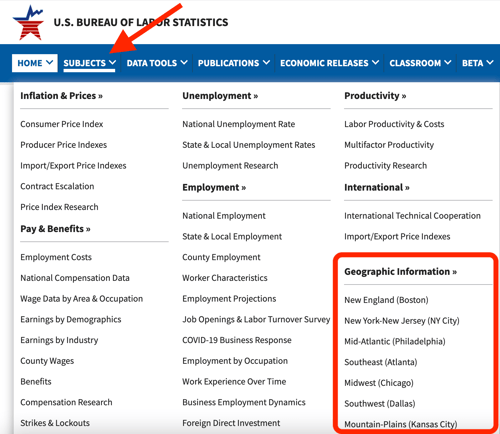Considering your company’s place in your industry is a vital action. Opening your mind to your competition’s chief offerings and honestly setting your own product alongside theirs surfaces pivotal opportunities. This comparative knowledge guides not only how your sales and marketing teams present their work, but perhaps even your entire company’s identity. There are so many metrics to factor in these competitive comparisons that you may feel tempted to just throw the blinders on and focus on your own stuff. The stuff you can control.
But, hang on, that’s a bizarre point to entertain. What if you really did narrow your product-vision to exclusively what’s inside your company’s four walls? A flippant disregard for the industry standard worked for Apple, and they delivered the iPhone! But the question remains: Could you really do that? Furthermore, are you as monomaniacal as Steve Jobs?
(The answer to that second one is definitely “no.” And Steve Jobs definitely watched his competition, how else could he have so thoroughly out-maneuvered them?)
For this exercise, let’s pretend for a moment you can only focus on your own products and internal initiatives for, say, the next 12 months. In this hypothetical without external info-gathering, you are no longer allowed to consider things like market intel, competitors, or business intelligence of any kind. Here’s how you’ll do it.
 1. Unfollow all your industry peers and chief competitors on social media.
1. Unfollow all your industry peers and chief competitors on social media.
This is a company-wide mandate. Gather all employees from all teams in your largest conference room. One by one, the middle-managers will insist each person audit their social media, including Facebook, Twitter, Instagram, and all others. During this audit, there will be a mass-unfollowing. All your employees are now forbidden from communicating with or following your competitors. This is not limited to corporate accounts, this includes personal feeds of friends and colleagues. You no longer care about their opinions or marketing and sales tactics.
Block and mute across LinkedIn, as well. Remember, your competition does not exist.
2. Block your chief competitors’ websites on your office network.
It’d be a tempting distraction for anyone to start cruising the competition’s sites for insight into, well, anything they’re doing. How they talk about their products, what marketing campaigns they’re running, details on the team that’s leading the company. Imagine how much time you waste in a workday surfing random sites while pretending it’s for something work-related? Take one final look and have your IT folks place your ten chief competitor’s URLs behind a firewall.
There, problem solved.
3. Unsubscribe from all mailing lists and blog subscriptions.
Your team of diligent marketers building out your company’s presence to attract leads, sales, and revenue are likely subscribed to your competition’s blogs. It’s good diligence to tune in on what they’re saying and how they’re saying it. Positioning your products is impossible without such context.
But you don’t care about context anymore. You won’t have to posture and feign interest in what your peers are publishing on their blog. Who even writes these posts? Probably some summer intern. I bet they drink kombucha and have roommates!
When you’re as focused on your own products as you are, you can’t waste time on such petty considerations. Unsubscribe and move on.
4. Your sales team will no longer entertain questions regarding your competition.
Once again, you’ll need to call a meeting—the sales team this time. In the next hour, you’ll train them on your clairvoyant new tactic: your competition does not exist.
If, in any case, a prospective customer brings up one of your former-competitors, your Account Executives will respond with one of the following:
Option A) “Nobody on earth, or in America, does what we do.”
Option B) “That’s not a product I’m familiar with. Sounds like a game my kid plays on his Sega.”
Option C) “Wait, who’s pitching who? Are you trying to make up a product mid-sentence?”
Option D) “What? What? A what? What? No, I heard you, the connection’s fine, I just didn’t understand the word. Look, we’re focused on our own products and initiatives. We’re unique, okay? We don’t have competitors, we’re apex predators.”
5. Do not attend any industry events.
Has your marketing team attended a few industry events in the past? They won’t anymore. It’ll save them some blisters and shin splints, that’s for sure. And you’re spending your time and money on your own efforts now.
If time is money and everyone wants to live forever, then spending another dollar on a meaningless industry event is just another death particle landing on your company’s receding hairline. To wit: this is money you can’t live without.
6. Delete your Google News alerts.
Take a moment to log into your Google News feed. Any prior alerts set to track keywords relevant to your competition, their products, leadership, or industry shifts must be deleted. You are not permitted to substitute mentions for your own company. It should be clear by now that you couldn’t spare a thought to how the industry interprets your presence in the ecosystem. If other people are writing about your company and your work, that’s information you can live without. You’ve your own actual work to do.
7. Block all review sites, too.
This includes, where relevant:
- Yelp
- Capterra
- Trustpilot
- G2 Crowd
- Software Advice
- Gartner Peer Insights
- iTunes App Store
- Google Play Store
Any information on these sites, concerning either your own products or your former-competitors, is no longer something you’ll concern yourself with. While hearing from your potential customers may seem like a good idea -- resist. You can’t focus on your competition’s customer experience.
8. Cancel contracts with research firms or B.I. platforms.
Do you subscribe to anything like Forrester, Gartner, or Tableau? You don’t anymore. Cancel them and bury any legacy data at sea. It was meaningless then, and it’s worthless now.
Like the buzz on social media, incessant blog email subscriptions, and countless industry events, this type of intel is costly and pointless. Don’t get distracted. There is you. There is only you and your work. Your team, your company, your brains—you are powerful, good-looking, and your third eye is open. You have sight beyond sight. You don’t need intelligence when you have internal focus and a sound strategy on how to stand out in a crowded industry—
—No, it’s not a crowded industry. It’s you out there. Only you. Alone.
Well, that’s the scenario. If you want to take this sardonic silliness honestly to key in on only your own planned roadmaps, and pretend the surrounding world is of no consequence, these are the parameters.
Hypotheticals aside, now that our we’ve concluded willful CI ignorance is an absurd tactic, imagine the opposite and place your business at an advantage with curated competitive insights. Shout out in the comments if you have any other crazy non-strategies you’d include to scuttle your own intelligence gathering. Otherwise, explore inroads to utilize software-powered competitive intelligence.

Related Blog Posts
Popular Posts
-
 How to Create a Competitive Matrix (Step-by-Step Guide With Examples + Free Templates)
How to Create a Competitive Matrix (Step-by-Step Guide With Examples + Free Templates)
-
 Sales Battlecards 101: How to Help Your Sellers Leave the Competition In the Dust
Sales Battlecards 101: How to Help Your Sellers Leave the Competition In the Dust
-
 The 8 Free Market Research Tools and Resources You Need to Know
The 8 Free Market Research Tools and Resources You Need to Know
-
 6 Competitive Advantage Examples From the Real World
6 Competitive Advantage Examples From the Real World
-
 How to Measure Product Launch Success: 12 KPIs You Should Be Tracking
How to Measure Product Launch Success: 12 KPIs You Should Be Tracking




